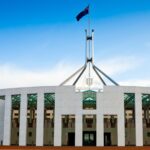Health Minister Mark Butler, Senator Jacqui Lambie and Dr Sophie Scamps were among the pollies who made an appearance at this morning’s first Parliamentary Friends of General Practice meeting.
Medicos have seized on the final two sitting weeks of the year to take the fight for fairer remuneration and regulation to Canberra, with both the RACGP and a medicolegal advocacy group scoring audiences in the corridors of power.
Ahead of its annual conference on Thursday and Friday this week, the RACGP was first to launch its offensive on the nation’s capital.
Great #GP@Parliament meeting with @JacquiLambie to discuss GP crisis. Call to action on increasing Medicare rebates +Bulk billing incentives. Along with reintroduce Junior Doctors GP term. pic.twitter.com/C2XKDoAAnJ
— Charlotte Hespe (@runningdoc14) November 21, 2022
Around 30 GPs from across the country attended Parliament House for the launch of the Parliamentary Friends of General Practice group this morning, followed by a day of what will add up to more than 90 meetings with politicians.
And Queensland obstetrician and newly-appointed chair of Australian Health Practitioners Advisory Solutions (AHPAS) Associate Professor Gino Pecoraro will be visiting Canberra on Wednesday this week to lobby for a fairer regulatory environment.
RACGP president Adjunct Professor Karen Price said Monday’s breakfast meeting went off smoothly, with representatives from the Greens, Labor and the Coalition parties in attendance.
“It is a crisis and to hear all the politicians acknowledge that was really helpful, because we’ve got solutions,” Professor Price told The Medical Republic.
The Parliamentary Friends of General Practice will be co-chaired by National Party Senator Susan McDonald, Labor MP Dr Gordon Reid, and Independent MP Dr Sophie Scamps.
The college’s three priorities for today are: lifting the rebate for long consultations, tripling the bulk billing incentive and bringing back the Prevocational General Practice Placements Program (PGPPP).
Importantly, Professor Price said, the excursion to Canberra is about connecting with politicians, who, she said, have been interested in the boots-on-the-ground local knowledge GPs are able to supply.
“Generally, I get a sense that they really want to do the right thing by all their electorates and we’re happy to help them with that,” she said.
“It’s not just a lobbying, give-us-money kind of thing.
“It’s a much broader conversation about delivering high quality healthcare, and we certainly don’t want to see Band-Aid solutions applied.”
Dr Scamps told TMR that she expected the issues facing general practice to be front and centre of health policy in the future.
“There are a number of MPs in Parliament, from the across the political spectrum, who were doctors before entering politics,” she said.
“As a group we now have the chance to leverage this wealth of real world knowledge and experience of caring for our communities to raise awareness about the issues facing general practice in Australia.”
RACGP Victoria chair Dr Anita Muñoz also said there was a sense that GPs were being listened to.
“There’s a widespread acknowledgement that we are deep in crisis,” she told TMR.
“And if we don’t pay general practice, then there will be the collapse of the entire health system.”
Health Minister Mark Butler had reiterated his concern over the low numbers of medical graduates going into general practice, she said.
Australian Society of General Practice president Dr Chris Irwin, who was not part of the Canberra delegation, applauded the fact that the RACGP was taking action but cautioned against hoping for radical change to come out of it.
“The main problem that both the RACGP and AMA have in their interactions with government is they believe that the government is operating with the same goals as we are,” he told TMR.
“What the RACGP has done time and time and time again is written well thought out essays to ministers and the Department of Health about how things could be better to optimise patient outcomes in Australia.
“The government reads these well thought out essays, they cherry pick out cost-saving measures, and then they ignore everything else that general practice has suggested.”
The key, Dr Irwin said, will be in making the government realise that there will be consequences to their ability to remain in power if they continue to pursue policies that undermine general practice.”
Professor Pecoraro, the AHPAS chair who will come into town later in the week, has a different – albeit similar – bone to pick with the government.
The main aim of his visit will be to advocate for changes to the way the Professional Services Review committee operates, particularly the prohibition on people who are being investigated having legal representation at hearings.
He will be meeting with senators and Department of Health officials and is also hoping to pull Mr Butler aside for a chat.
“All that [this issue] requires is a stroke of the pen and appropriate legislation, making it acceptable for doctors not only to have lawyers there but [for lawyers] to be able to speak on their behalf,” Professor Pecoraro told TMR.
New legislation also allows the names of doctors who have had a complaint made against them to be published prior to any investigation into the allegations.
“[Doctors] have effectively lost the rights to the presumption of innocence that every other Australian citizen has,” said Professor Pecoraro.
The lack of procedural fairness is one issue, but there are also other unintended complications which can arise when a doctor feels their reputation has been damaged.
“I’ve lost two members of my profession this year that have [died by] suicide,” he said.
“We have an absolute epidemic of doctors [dying by] suicide, and for at least one of those two people I knew it was directly related to a complaint that was made against the person to AHPRA.
“They were found not guilty, but that came out the day after they found the body.”
One very specific change Professor Pecoraro would like to see put in place is that, if someone is the subject of an AHPRA or PSR notification, the agency involved should be required to ensure that person is in a therapeutic relationship with a mental health provider while the process is ongoing.
If this article has caused you distress or you would like to reach out for support, these services are available:
Doctors4doctors crisis support hotline: 1300 374 377
Lifeline: 13 11 14
Beyond Blue: 1300 22 46 36






